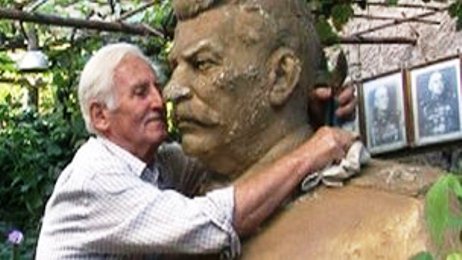Uncle Joe

Millions died when Stalin imposed iron discipline and state terror to root out "enemies of the people" and build a communist state.
But in the town of Gori, where he was born, the city council recently decided to re-erect a huge statue of Stalin, which the pro-Western government of President Mikheil Saakashvili took down almost three years ago. It is a sign, historians say, that the country needs to confront its Soviet past.
Gori`s main tourist attraction is its museum to Stalin. The ornate building, with its collection of heroic photographs and Stalin`s death mask, appears frozen in time - a Soviet shrine to the dictator, almost untouched since the museum was built in 1957.
But Olga Tochishvili, who has worked as a guide here since the Soviet era, says attitudes towards Stalin are changing.
"In Georgia, most of the old generation like Stalin. They think he was a great statesman, with his small mistakes. Young people don`t like Stalin, of course. Our young people are not interested in history and they don`t like Stalin."
Hero or villain?
But it is not just attitudes. Gori`s cityscape has changed as well.
The main boulevard, Stalin Street, used to be dominated by the huge statue of the dictator. But it was removed in 2010 by Mr Saakashvili`s westernising government - a decision that upset many people in Gori.
Nikoloz Kapanadze, who earns tips by helping cars to find parking places in Stalin Street, told me the statue should be returned.
"Everybody wants that, not only me, but the whole of Gori, the whole of Georgia wants the monument to be installed where it was before. I am 65 and I`ve only heard good things about him throughout my life."
A few weeks ago the city council allocated funds to re-erect the statue at the Stalin museum.
The decision seems to be partly the result of a political upheaval in Georgia. Mr Saakashvili`s party was defeated in parliamentary elections last October by the Georgian Dream coalition, which wants to repair Georgia`s rocky relations with Russia.
Gori`s new mayor, David Razuadze, from Georgian Dream says Stalin`s statue will be re-installed by the summer.
"People in Gori have this feeling that the name Stalin is known in the world and so is their little town… Georgia is known worldwide because of Stalin. And the position of the previous government, which was basically an insult, was unbearable. And I say, you can condemn Stalin`s period, you can condemn political repressions and the old way of life - but you should not touch personalities."
The statue seems to have become part of the tug of war between Georgia`s political parties.
Georgian `backsliding`
Over cappuccino in an upmarket cafe in the capital, Tbilisi, Giorgi Kandelaki, an MP from Mr Saakashvili`s party, told me the decision to re-erect the statue was a backward step.
"We lost the elections and so unfortunately we have many signs of democratic backsliding in Georgia or flirtations with the Soviet past. And the comeback of this statue is one such symbolic but very worrying sign. And in Gori the decision to allocate funds to reinstate the statue was made not by some private people but by the city council and by the local governor, who represents the ruling council. I think this is a scandalous fact."
Mr Kandelaki, 31, says the statue should have been removed years ago.
"No country that aspires to become a normal country can have a symbol that pays tribute to Stalin. Everyone in the world knows Stalin as the bloodiest dictator in history. And the second reason relates specifically to Georgia. In 1921, when Georgia was a parliamentary democracy, Stalin was the initiator of the Soviet Russian invasion and occupation of Georgia."
But history in Georgia is a complicated business.
Lasha Bakradze, a professor of Soviet history at Tbilisi University, recently presented a new survey commissioned by the Carnegie Endowment for International Peace, which found that 45% of Georgians expressed a positive attitude to Stalin. He says the poll shows that Georgia needs to confront and work through its Soviet past.
"Nothing is done to explain to the population who Stalin was," he told me.
"It has not been talked about. Also in school books you don`t find explanations about what the totalitarian system was. And so it is understandable why people are still in this Soviet way of thinking, that Stalin was `Our Boy`, a very strong leader."
"Georgian society has a problem," he continued.
"On one side they can have sympathy for Stalin and on the other side the biggest part of Georgians are pro-democracy, freedom and so on. It is very primitive, patriotic thinking. Somebody was famous and this somebody was Georgian."
At the museum, change is coming - if slowly. A small room under the stairs displays the names of a few dozen local victims of Stalin`s repressions. But even as further revisions are being discussed, Olga Tochishvili and her colleagues are looking forward to the return of the statue - not for political reasons, but for tourism.
"Many foreign visitors asked us, where is Stalin`s statue? I think it will be better to put up the statue in front of our museum for our visitors, because they want to see the statue."















































